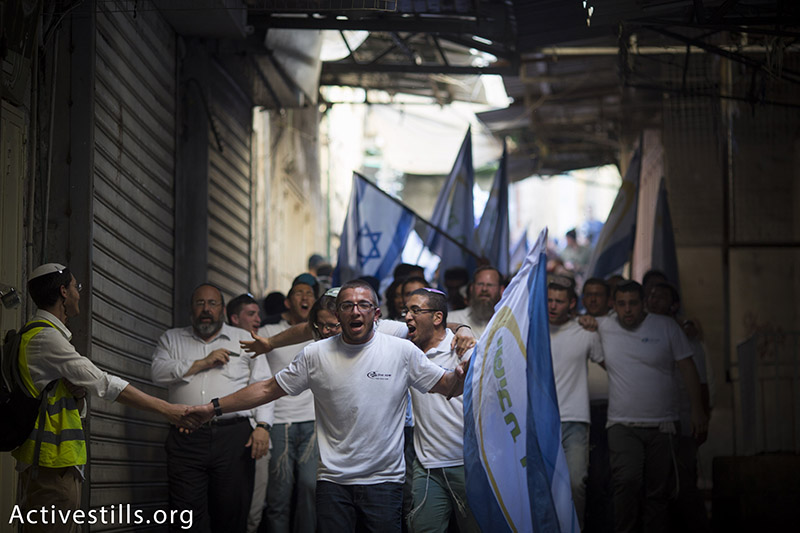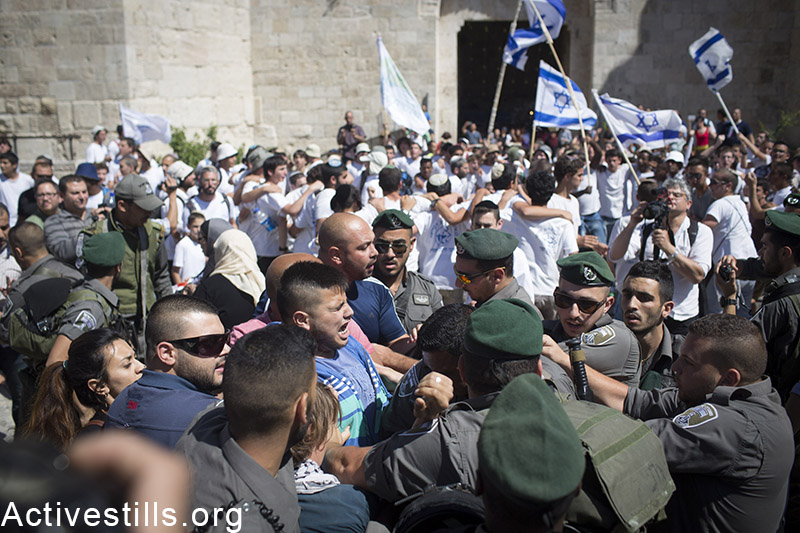I remember the nightmare of Jerusalem Day as a child in the Muslim Quarter: the right-wingers rampaging through the alleyways, the racist slogans, the police standing by, and my father staying home from work to guard our home.
By Suleiman Maswadeh

Jerusalem Day is approaching, and with it my anxiety. Since I was a young boy, Jerusalem Day, in which Israelis mark what they call the “reunification” of West and East Jerusalem, is a difficult and strange day for me. A day of rage, grief, and lack of security.
In my childhood I witnessed right-wing Israelis violently rampaging through the Old City, and especially in the Muslim Quarter where I lived. These rampaged only intensified over the years, due to the security situation as well as the leniency of the authorities. Those who celebrate Jerusalem Day know full well that these kinds of actions are an outright provocation toward the city’s Muslim inhabitants. This is especially felt in the Muslim Quarter.
Take the day off
The violence usually takes place right under the nose of Israeli security forces. Right-wing extremists provoke us by aggressively banging on our doors and target young Arabs. The reason is simply: they know that the young are easily riled up. And if anyone dare think of responding, we all know who the police will believe. The rampages end with a giant march through Damascus Gate, during which Israelis are accompanied by a large police presence. The truth is they don’t need the police; most of them are armed with automatic rifles, and can eliminate any threat. After all, they already have permission to do so.
My parents would forbid me from leaving the house on Jerusalem Day. They told me that the intense heat could give me heat stroke. I do not know how my mother thought that this was going to convince a child like myself; after all, it was clear to me as a young kid that the weather was perfect for, say, a family outing. I know that there was something wrong with their claim, and the Hebrew songs being sung under our home, along with a dramatic increase in traffic in our neighborhood, was enough of a reason to understand that this was far more serious that a “hot day.” Over time I understood that my family forbade me from going outside because they wanted us to protect our home. It was no coincidence that my father took a day off on Jerusalem Day, spending all day in front of the television and the window with a newspaper and cup of coffee.
Today I try to avoid Jerusalem on this day. I do my best to go places that can help me forget the fact that I live in Jerusalem. Two years ago, I spent the day with a Hebrew book on the beach, reading and translating all the new words I was learning. But now I developed a new habit that has changed my life: I take my computer, go to the beach, and write every thought that comes to mind.
Like a cancer

I know that the demonstrations, the racist marches, the anti-Arab slogans (“Jews have a soul, Arabs are sons of bitches”) will never end on this day. The police is not interested in confronting the extremists, meanwhile the government doesn’t want to be seen as sympathetic to Arabs. Thus, no one takes any proactive steps to stop the incitement, which only causes the situation to worsen. In fact, at the end of Jerusalem Day, the police set up a giant, blue human wall to prevent confrontations between Palestinian residents and the celebrants, who paralyze an entire city to celebrate this day.
On Jerusalem Day, you will be able to hear politicians on both the right and the left who pretend to celebrate this day, emphasizing that Jerusalem is a special city, despite those who don’t see it as a unified city. I, on the other hand, invite all these politicians to take a short tour of Jerusalem to show them the obvious: that Jerusalem is not unified — it is shattered to pieces. One side enjoys modernization, while the other is the victim of deliberate policies of neglect, poverty, and crime that take over the Arab neighborhoods like a cancer in the body.
Suleiman Maswadeh is an activist who studies political science and communications. This article was originally published in Hebrew on Local Call.

